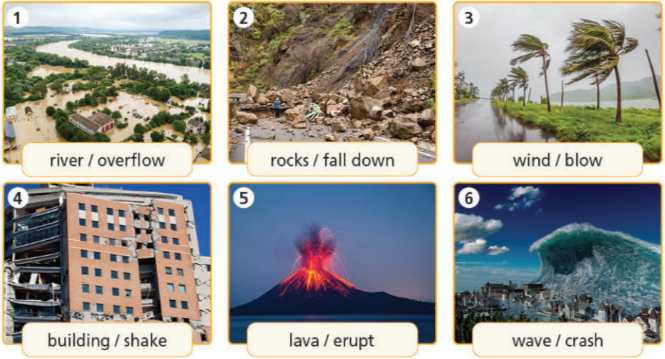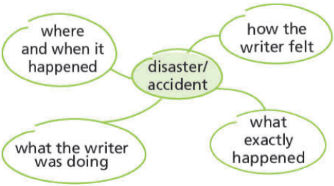Tiếng Anh 8 Unit 2 2f. Skills1. Look at the pictures and put them in the order of the story. 2. Read the text and answer the questions (1-5). 3. Imagine you experienced the volcanic eruption in the text. Use the questions in Exercise 2 and your own questions to ask and answer about the disaster with your partner. 4 a) Listen and repeat. b) Use the words in Exercise 4a and the Past Simple to complete the sentences (1-6). 5. Listen to an interview about a natural disaster and decide if the statements (1-5) are R (right) or W GÓP Ý HAY - NHẬN NGAY QUÀ CHẤT Gửi góp ý cho HocTot.Nam.Name.Vn và nhận về những phần quà hấp dẫn
Lựa chọn câu để xem lời giải nhanh hơn
Bài 1 Reading 1. Look at the pictures and put them in the order of the story. (Nhìn vào những bức tranh và đặt chúng theo thứ tự của câu chuyện.)
WHAT A DISASTER! It was a beautiful morning in June and the sun was shining. My parents and I were having a wonderful holiday in Hawaii. We swam in the sea and walked on the beach every day. On our last day, we decided to go hiking up a volcano. We were climbing near the top of the volcano when we heard a loud noise coming from deep under the ground. Then, the volcano shook, smoke came out of the top, and lava came down the side. We were terrified! We ran as fast as we could back down the volcano. We felt worried because so much lava erupted from the top. Luckily, we got to the road and a bus picked us up just in time. We drove off quickly. Later, we watched the news to find out what happened. The eruption didn't injure anyone, bit destroyed some buildings and cars. We felt relieved because everyone was safe. Phương pháp giải: Tạm dịch: Đó là một buổi sáng đẹp trời tháng Sáu và mặt trời đang chiếu sáng muôn nơi. Bố mẹ tôi và tôi đã có một kỳ nghỉ tuyệt vời ở Hawaii. Chúng tôi đi bơi ở biển và đi bộ trên bãi biển mỗi ngày. Vào ngày cuối cùng của kỳ nghỉ, chúng tôi quyết định đi bộ leo lên một ngọn núi lửa. Chúng tôi đang leo lên gần đỉnh núi lửa thì nghe thấy một tiếng động lớn phát ra từ sâu dưới lòng đất. Sau đó, núi lửa rung chuyển, khói bốc lên từ đỉnh và dung nham chảy xuống. Chúng tôi đã rất sợ hãi! Chúng tôi chạy nhanh hết mức có thể để thoát khỏi ngọn núi lửa. Chúng tôi cảm thấy lo lắng vì quá nhiều dung nham phun trào từ trên xuống. May mắn thay, chúng tôi đã đến đường cái và một chiếc xe buýt đón chúng tôi đúng lúc. Chúng tôi lái xe đi nhanh chóng. Sau đó, chúng tôi xem tin tức để tìm hiểu chuyện gì đã xảy ra. Vụ phun trào không làm ai bị thương, chỉ phá hủy một số tòa nhà và ô tô. Chúng tôi cảm thấy nhẹ nhõm vì mọi người đều an toàn. Lời giải chi tiết:
Bài 2 2. Read the text and answer the questions (1-5). (Đọc văn bản và trả lời câu hỏi (1-5).) 1. Where did the disaster happen? (Thảm họa xảy ra ở đâu?) 2. What was the writer doing when it started? (Tác giả đang làm gì khi nó bắt đầu?) 3. What came down the side of the volcano? (Cái gì đã chảy xuống bên sườn núi lửa?) 4. Did the disaster injure anyone? (Thảm họa có làm ai bị thương không?) 5. How did the writer feel after the disaster? (Tác giả cảm thấy thế nào sau thảm họa?) Lời giải chi tiết: 1. It happened at a volcano in Hawaii. (Nó đã xảy ra tại một ngọn núi lửa ở Hawaii.) 2. He was climbing near the top of the volcano. (Cậu ấy đang leo lên gần đỉnh núi lửa.) 3. Lava came down the side of the volcano. (Dung nham chảy xuống sườn núi lửa.) 4. No, it didn’t. It destroyed some buildings and cars (Không. Nó phá hủy một số tòa nhà và xe hơi.) 5. He felt relieved because everyone was safe. (Anh cảm thấy nhẹ nhõm vì mọi người đều an toàn.) Bài 3 3. Imagine you experienced the volcanic eruption in the text. Use the questions in Exercise 2 and your own questions to ask and answer about the disaster with your partner. (Hãy tưởng tượng em đã trải qua vụ phun trào núi lửa trong bài viết. Sử dụng các câu hỏi trong Bài tập 2 và các câu hỏi của riêng em để hỏi và trả lời về thảm họa với bạn cặp của em.) A: When did the volcanic eruption happen? (Vụ núi lửa phun trào xảy ra khi nào?) B: It happened… (Nó xảy ra…) A: Where did it happen? (Nó đã xảy ra ở đâu?) B: It happened… Lời giải chi tiết: A: When did the volcanic eruption happen? (Vụ núi lửa phun trào xảy ra khi nào?) B: It happened yesterday, on my last day of vacation. (Chuyện xảy ra ngày hôm qua, vào ngày nghỉ cuối cùng của tôi.) A: Where did it happen? (Nó đã xảy ra ở đâu?) B: It happened at a volcano in Hawaii. (Ở một ngọn núi lửa ở Hawaii.) A: What happened with the volcano? (Điều gì đã xảy ra với ngọn núi lửa?) B: It shocked, smoke came out of the top, and lava came down the side. (Nó rung lắc, khói bốc lên từ đỉnh và dung nham chảy xuống bên cạnh.) A: How did you escape from this? (Làm thế nào bạn thoát khỏi điều này?) B: I ran as fast as I could back down the volcano and got to the road and a bus picked me up just in time. (Tôi đã chạy nhanh hết mức có thể để thoát khỏi núi lửa tới đường cái và một chiếc xe buýt đã đón tôi đúng lúc.) Bài 4 a Vocabulary Natural disasters (Thiên tai) 4a) Listen and repeat. (Nghe và đọc lại.)
Phương pháp giải: river (n)/ overflow (v): sông / tràn ra rocks (n)/ fall down (v): đá / rơi xuống wind (n)/ blow (v): gió/ thổi building (n)/ shake (v): tòa nhà/ rung lắc lava (n)/ erupt (v): dung nham / phun trào wave (n)/ crash (v): sóng/ va đập Bài 4 b b) Use the words in Exercise 4a and the Past Simple to complete the sentences (1-6). (Sử dụng các từ trong Bài tập 4a và thì Quá khứ đơn để hoàn thành các câu (1-6).) 1. The wind blew hard and a lot of trees fell down. (Gió thổi mạnh và nhiều cây cối bị đổ.) 2. The and water covered the town. 3. from the top of the volcano. 4. The during the earthquake. 5. A into the city and the water destroyed a lot of buildings. 6. the road during the landslide. Lời giải chi tiết: 2. The river overflew and water covered the town. (Dòng sông tràn ra và nước bao phủ thị trấn.) 3. Lava erupted from the top of the volcano. (Dung nham phun trào từ đỉnh núi lửa.) 4. The building shook during the earthquake. (Tòa nhà rung chuyển trong trận động đất.) 5. A wave crashed into the city and the water destroyed a lot of buildings. (Một con sóng ập vào thành phố và nước phá hủy rất nhiều tòa nhà.) 6. Rocks fell down the road during the landslide. (Đá rơi xuống đường trong vụ sạt lở đất.) Bài 5 Listening 5 Listen to an interview about a natural disaster and decide if the statements (1-5) are R (right) or W (wrong). (Nghe một cuộc phỏng vấn về một thảm họa thiên nhiên và quyết định xem các câu (1-5) là R (đúng) hay W (sai).) 1. The disaster happened last month. 2. Cassie's family were driving when the disaster started. 3. The disaster was an earthquake. 4. Cassie's father was injured in the disaster. 5. Cassie felt terrified when the disaster started. Phương pháp giải: Bài nghe: Man: Hello, Cassie. Can you tell us what happened to you? Cassie: Yes, I was on a holiday in the mountains with my family last month when I experienced a natural disaster. Man: Oh no. What exactly happened? Cassie: My parents and I were walking on the side of the road. Then suddenly we heard a loud noise and we felt the ground shaking. We thought it was an earth quake, but then we saw rocks falling down the side of the mountain. It was a landslide. We ran as fast as we could to get out of it. Man: Oh dear. Was everyone okay? Cassie: Unluckily. My dad was injured. Man: Oh, how terrible! Cassie: Yes, I was terrified when we saw the rocks coming towards us. Man: Thank you for telling us what happened. Later we are talking to... Tạm dịch: Người đàn ông: Chào, Cassie. Bạn có thể cho chúng tôi biết chuyện gì đã xảy ra với bạn không? Cassie: Vâng, tôi đang đi nghỉ ở vùng núi với gia đình vào tháng trước thì gặp phải một thảm họa thiên nhiên. Người đàn ông: Ôi không. Chính xác thì chuyện gì đã xảy ra? Cassie: Cha mẹ tôi và tôi đang đi bộ bên lề đường. Rồi đột nhiên chúng tôi nghe thấy một tiếng động lớn và chúng tôi cảm thấy mặt đất rung chuyển. Chúng tôi nghĩ rằng đó là một trận động đất, nhưng sau đó chúng tôi thấy những tảng đá rơi xuống sườn núi. Đó là một trận lở đất. Chúng tôi đã chạy nhanh nhất có thể để thoát khỏi nó. Người đàn ông: Ôi trời. Mọi người có ổn không? Cassie: Thật không may. Bố tôi đã bị thương. Người đàn ông: Ôi, thật khủng khiếp! Cassie: Vâng, tôi đã rất sợ hãi khi nhìn thấy những tảng đá tiến về phía chúng tôi. Người đàn ông: Cảm ơn bạn đã cho chúng tôi biết những gì đã xảy ra. Sau đó chúng tôi đang nói chuyện với... Lời giải chi tiết:
1. R The disaster happened last month. (Thiên tai đã xảy ra vào tháng trước.) Thông tin: Yes, I was on a holiday in the mountains with my family last month when I experienced a natural disaster. 2. W Cassie's family were driving when the disaster started. (Gia đình của Cassie đang lái xe thì thảm họa bắt đầu.) Thông tin: My parents and I were walking on the side of the road. 3. W The disaster was an earthquake. (Thảm họa là trận động đất.) Thông tin: We thought it was an earth quake, but then we saw rocks falling down the side of the mountain. It was a landslide. 4. R Cassie's father was injured in the disaster. (Bố của Cassie đã bị thương trong vụ thiên tai này.) Thông tin: Unluckily, my dad was injured. 5. R Cassie felt terrified when the disaster started. (Cassie cảm thấy hoảng sợ khi thiên tai bắt đầu.) Thông tin: Yes, I was terrified when we saw the rocks coming towards us. Bài 6 6 Listen to the recording from Exercise 5 again and take notes. Imagine you experienced the disaster. Tell your partner about your experience. (Nghe đoạn ghi âm từ Bài tập 5 một lần nữa và ghi chú. Hãy tưởng tượng em đã trải qua một thảm họa. Nói với bạn cặp của em về trải nghiệm đó.) Lời giải chi tiết: An: Hello, long time no see. How was your holiday last month? Minh: Hi. It wasn’t good. I was on a holiday at a beautiful beach with my family last month when I experienced a natural disaster. An: Oh no. What exactly happened? Minh: My parents and I were walking on the beach. Then suddenly we heard a loud noise and we saw something was coming from the sea. We thought it was a big wave, but then we saw many people run back to the land. It was a tsunami. We ran as fast as we could to get out of it. An: Oh dear. Was everyone okay? Minh: Luckily, my family was safe. An: Good to hear that! Tạm dịch: An: Xin chào, lâu rồi không gặp. Kỳ nghỉ tháng trước của bạn như thế nào? Minh: Chào. Nó không tốt chút nào. Tớ đang đi nghỉ ở một bãi biển xinh đẹp với gia đình vào tháng trước thì gặp phải một thảm họa thiên nhiên. An: Ôi không. Chính xác thì chuyện gì đã xảy ra? Minh: Bố mẹ tớ và tớ đang đi dạo trên bãi biển. Sau đó, đột nhiên chúng tớ nghe thấy một tiếng động lớn và chúng tớ thấy có thứ gì đó đang đến từ biển. Chúng tớ tưởng chỉ là một cơn sóng lớn thôi, nhưng sau đó tớ thấy nhiều người chạy trở vào bờ. Đó là một cơn sóng thần. Chúng tớ đã chạy nhanh nhất có thể để thoát khỏi nó. An: Ôi trời. Mọi người có ổn không? Minh: May mắn là gia đình tớ đã được an toàn. An: Thật tốt khi nghe điều đó! Writing 1 Writing (A story about a natural disaster/ an accident) Task analysis (Phân tích bài tập) 1. Read the task and complete the table. (Đọc bài tập và hoàn thành bảng.)
Lời giải chi tiết:
Writing 2 Model analysis (Phân tích mẫu) 2 Read the story. How did the writer set the scene? Underline the sentences in the text. (Đọc câu truyện. Tác giả đã xây dựng bối cảnh như thế nào? Gạch chân dưới các câu trong văn bản.) On Monday morning, I experienced a terrible fire in a building in West Street. I was walking to school with my friends when I saw smoke from the building. Then, the fire spread quickly. We ran down the street away from the fire. Soon, the fire fighters arrived and they put out the fire. The fire didn't injure or kill anyone, but it destroyed the building. I was terrified when it was happening, but I was relieved because everyone was safe. Phương pháp giải: Tạm dịch: Vào sáng thứ Hai, tôi chứng kiến một trận hỏa hoạn khủng khiếp tại một tòa nhà ở Phố Tây. Tôi đang đi bộ đến trường với bạn bè thì nhìn thấy khói bốc ra từ tòa nhà. Sau đó, ngọn lửa lan nhanh. Chúng tôi chạy xuống đường tránh xa đám cháy. Ngay sau đó, lính cứu hỏa đã đến và họ dập lửa. Trận hỏa hoạn không làm ai bị thương hay thiệt mạng, nhưng nó đã phá hủy tòa nhà. Tôi đã rất sợ hãi khi nó xảy ra, nhưng tôi cảm thấy nhẹ nhõm vì mọi người đều an toàn. Lời giải chi tiết:
Writing 3 3. Read the story again and complete the spidergram in your notebook. (Đọc lại câu chuyện và hoàn thành biểu đồ lưới trong vở của em.)
Lời giải chi tiết:
Writing 4 4. Imagine you experienced a natural disaster or an accident. Write a story about it (about 80-100 words). (Hãy tưởng tượng em đã trải qua một thảm họa thiên nhiên hoặc một tai nạn. Viết một câu chuyện về nó (khoảng 80-100 từ).) Lời giải chi tiết: I was on a holiday at a beautiful beach with my family last month when I experienced a natural disaster. My parents and I were walking on the beach. Then suddenly we heard a loud noise and we saw something was coming from the sea. We thought it was a big wave, but then we saw many people run back to the land. It was a tsunami. We ran as fast as we could to get out of it. Luckily my family was safe. I was terrified when it was happening, but I was relieved because everyone was safe. Tạm dịch: Tôi đang đi nghỉ ở một bãi biển xinh đẹp với gia đình vào tháng trước thì tôi trải qua một thảm họa thiên nhiên. Bố mẹ tôi và tôi đang đi dạo trên bãi biển. Sau đó, đột nhiên chúng tôi nghe thấy một tiếng động lớn và chúng tôi thấy có thứ gì đó đang đến từ biển. Chúng tôi tưởng là sóng lớn, nhưng sau đó thấy nhiều người chạy trở vào bờ. Đó là một cơn sóng thần. Chúng tôi chạy nhanh nhất có thể để thoát khỏi nó. May mắn là gia đình tôi đã được an toàn. Tôi đã rất sợ hãi khi nó xảy ra, nhưng tôi cảm thấy nhẹ nhõm vì mọi người đều an toàn.
>> Học trực tuyến lớp 8 trên Tuyensinh247.com. Đầy đủ khoá học các bộ sách: Kết nối tri thức với cuộc sống; Chân trời sáng tạo; Cánh diều. Cam kết giúp học sinh lớp 8 học tốt, hoàn trả học phí nếu học không hiệu quả. PH/HS tham khảo chi tiết khoá học tại: Link
|






















